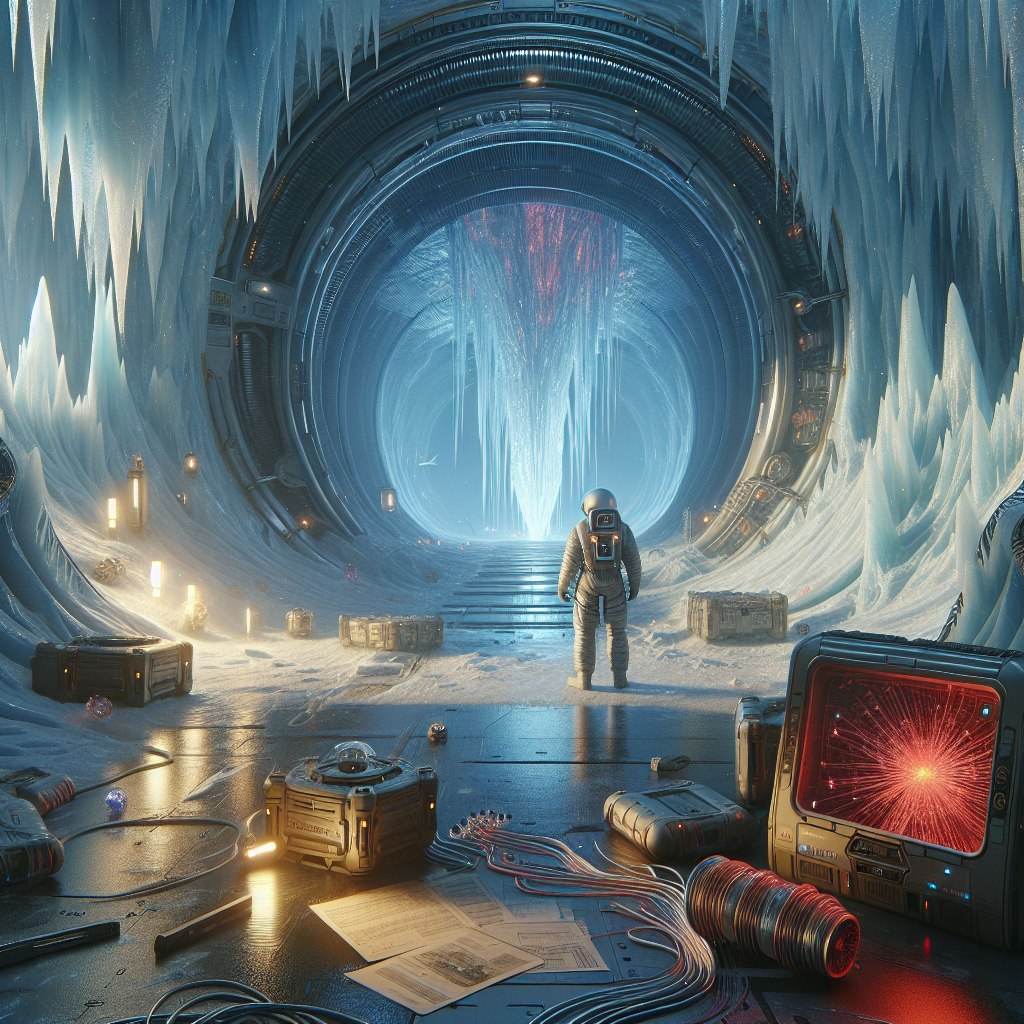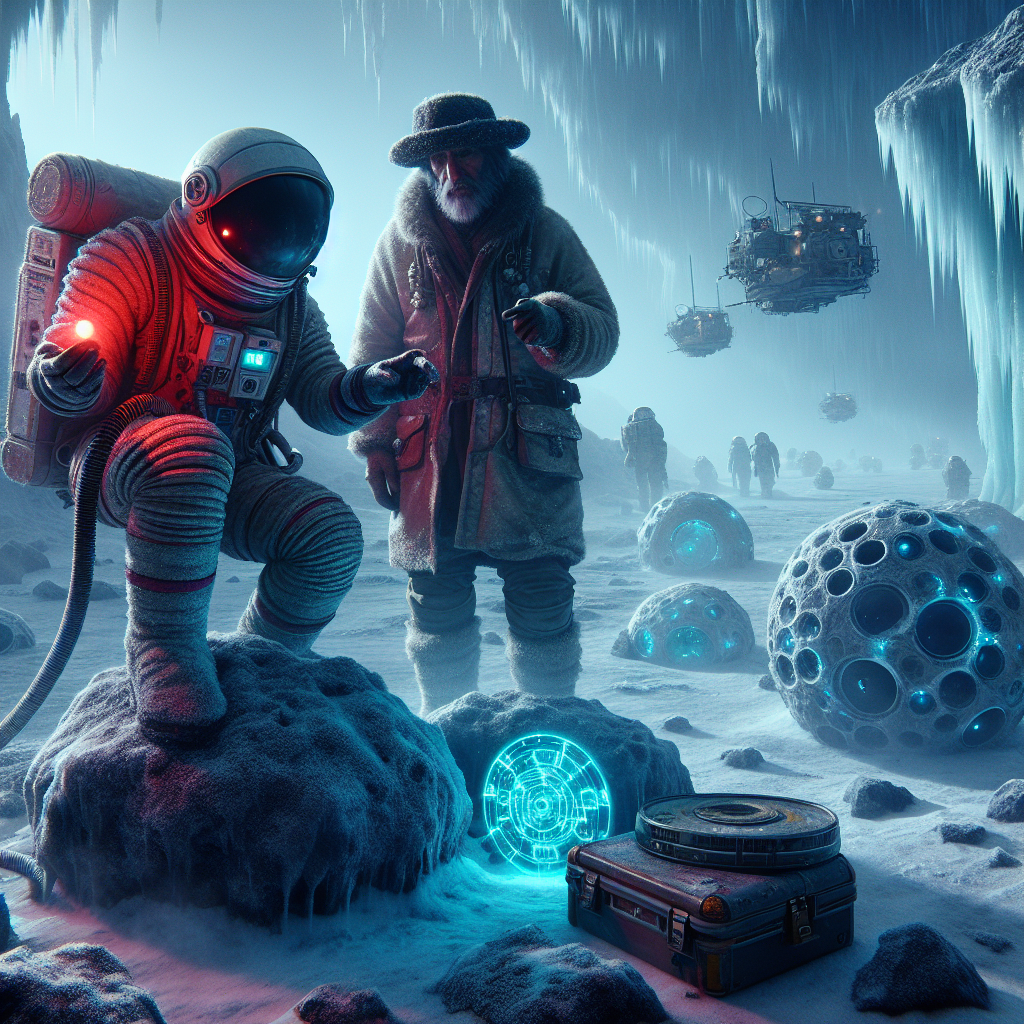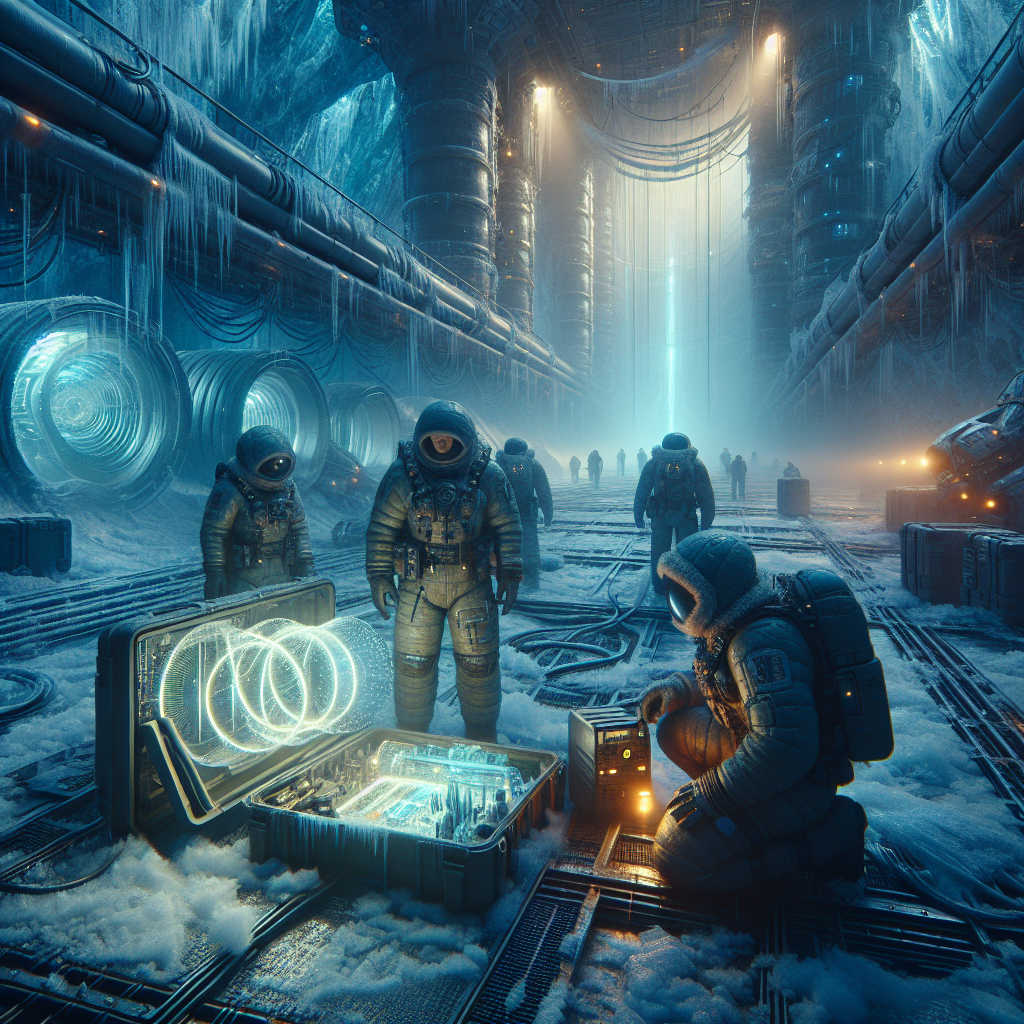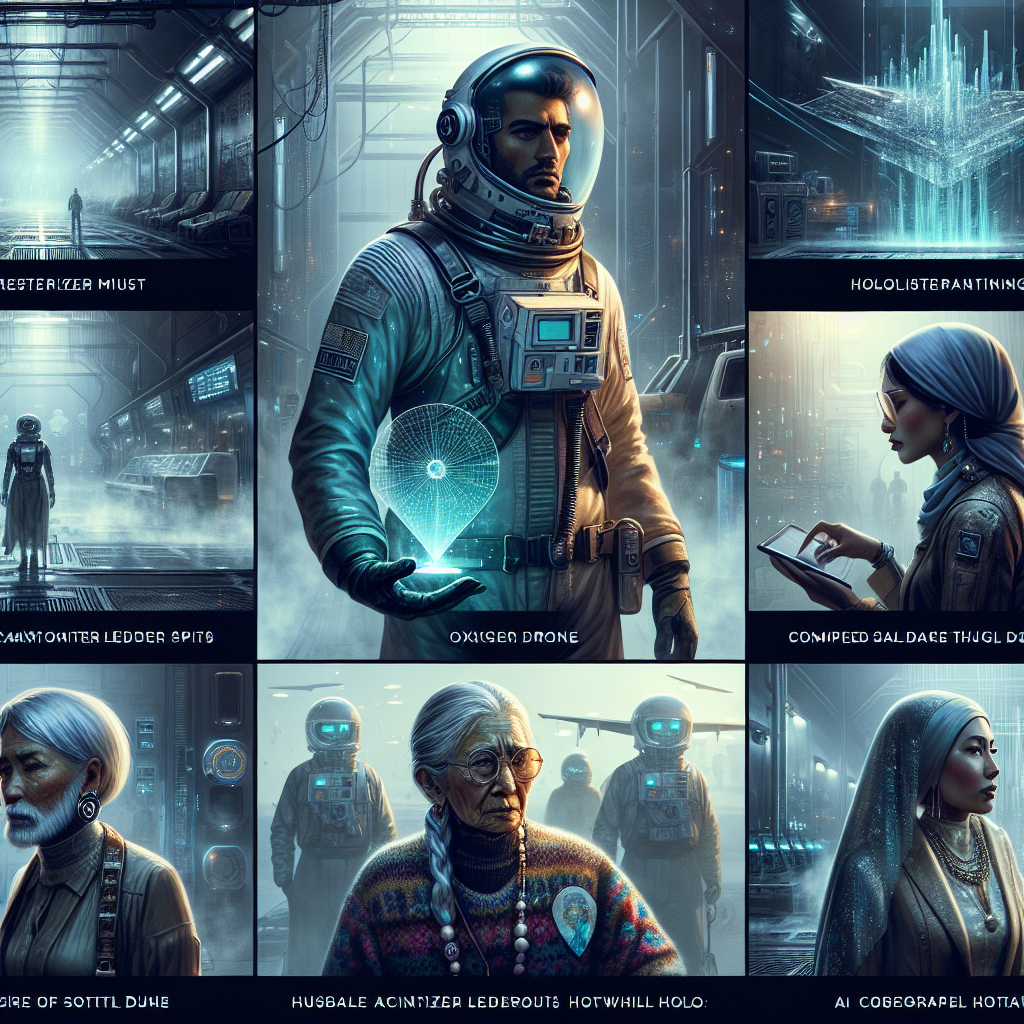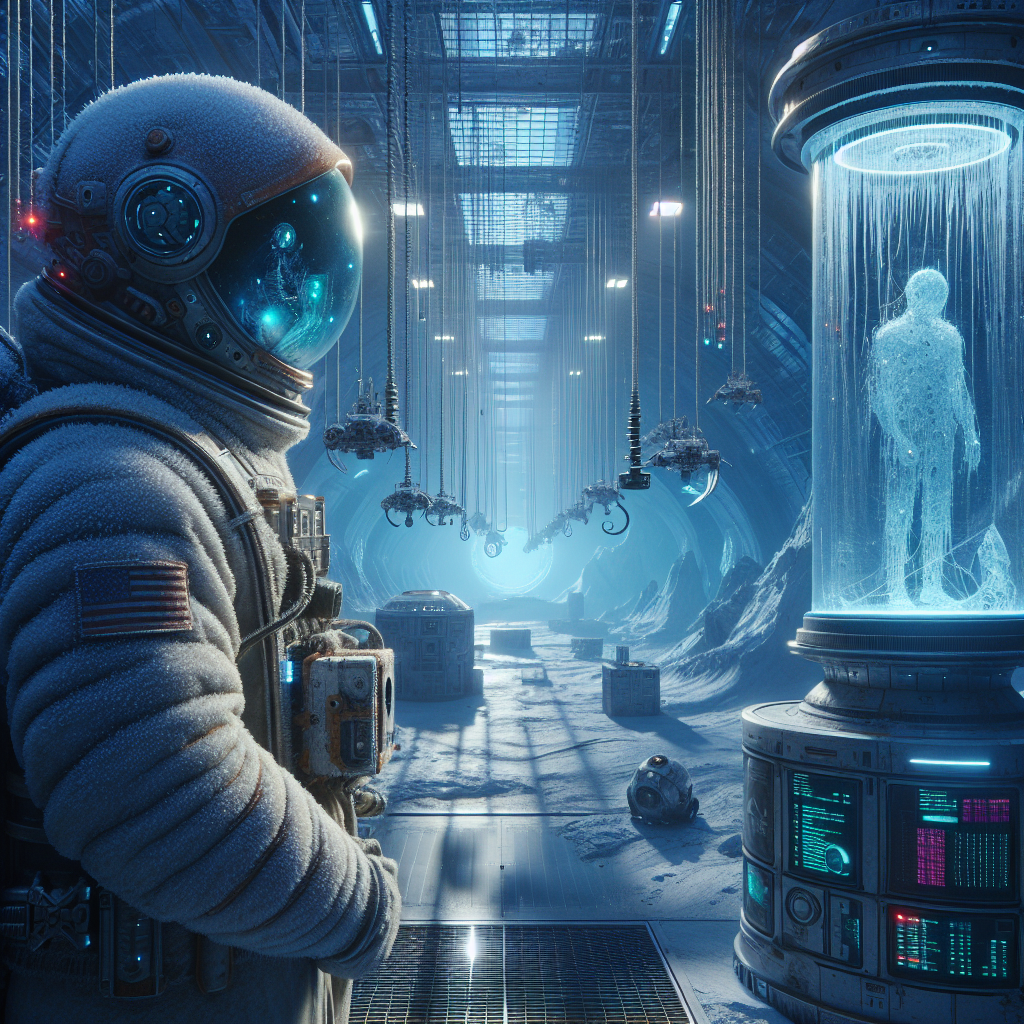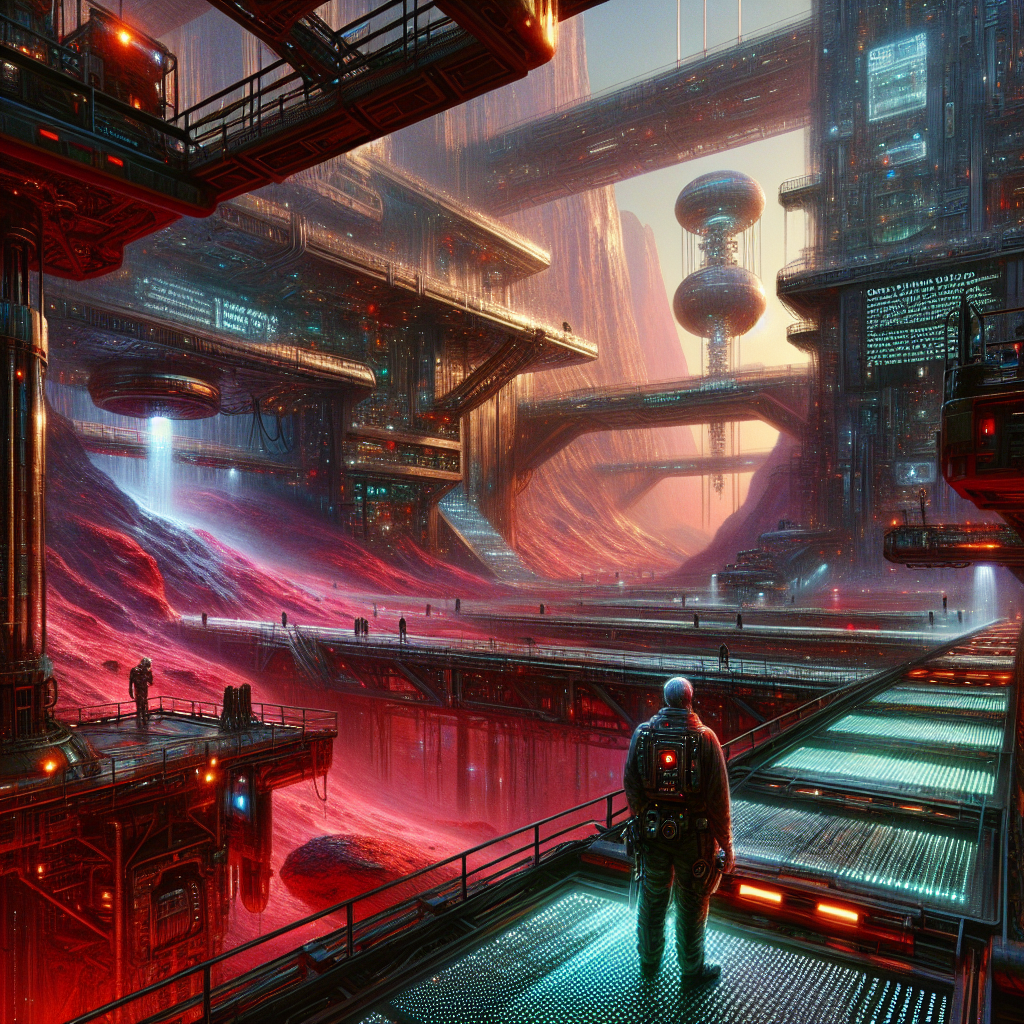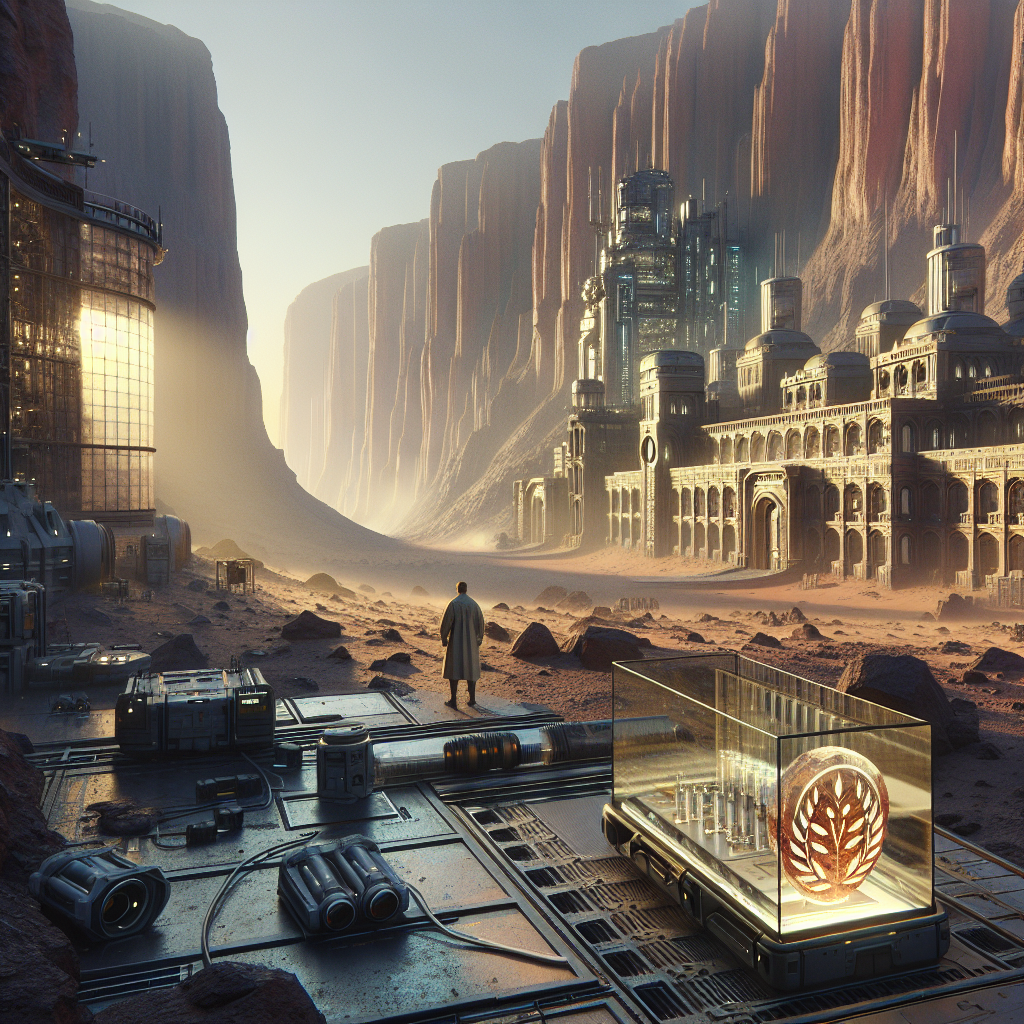CHAPTER 1 – Frostbound Claim at Clavius‑9
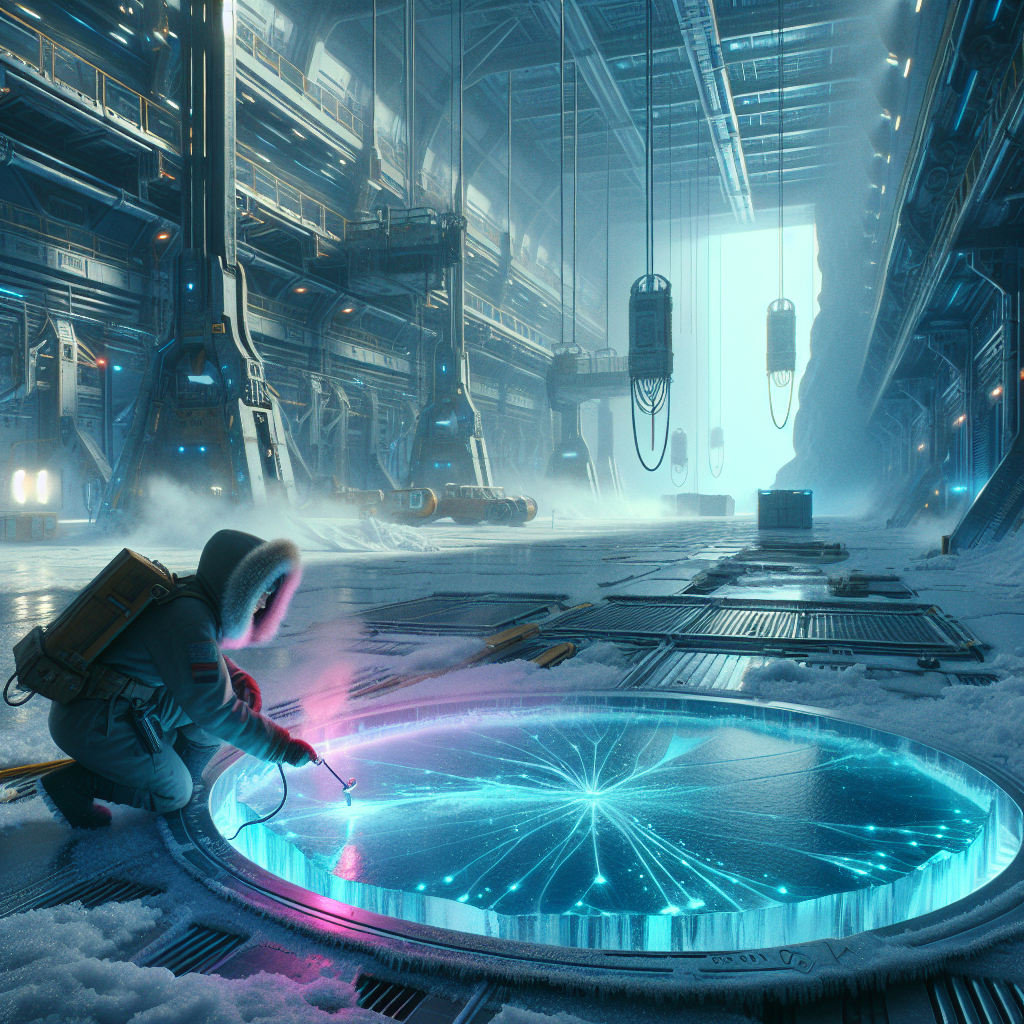
Inspector Malik Kato arrives at the ice‑mining colony Clavius‑9 to mediate a volatile dispute over sovereign water rights to a newly captured comet between the colony and a Tekker salvaging outfit called RiverRun. In the echoing hangar, amid flickering neon and the clang of ore lifts, he finds doctored security feeds, a missing tug pilot, and signs of subtle sabotage at the salvage tags. Using old‑school tools, Malik drills a sliver of ice from beneath the tag and discovers a metamaterial loop encoded with a partial legal “key” favoring a Belt doctrine. Quantum dot residue suggests a throwaway mesh network passed hidden messages during the brawl. As tensions spike, Malik follows a faint signal around the comet and finds a legal phrase etched by sublimation into frost and a dull red glow embedded in the ice. The chapter closes as the letters evaporate and the glow pulses, leaving Malik with a cryptic, vanishing message and a seed of evidence no one expected.
Clavius‑9 crouches on Luna’s south rim like a scab of light against vacuum, its domes and ribs stitched into the crater wall. The smell of recycled air is thin, metallic, faintly sweet with algae and antiseptic; Malik Kato tastes it before he hears the ore lifts. Their chains clatter through the bones of the colony, a steady clang that makes the canteen’s green neon flicker like nervous eyelids. Dust rises in slow feathers in reduced gravity, and every bootfall prints a crescent of tracked regolith.
Malik is Earth‑grown but lunar‑based, a biomorph minimalist who keeps his body honest and his mind tuned to the weight of facts. The call pings him off a case note: dispute at Docking Spindle C, sovereign water rights to a newly captured comet. The shift AI’s voice is clipped and dry, naming injured riggers, listing treaty citations, and warning of risk to “critical life‑support inventories.” One side is the Clavius Cooperative, union crews who keep the domes humid and habitable under Luna Code. The other is RiverRun, a Tekker salvaging outfit from the Belt whose crews bristle with wetware and law.
Malik swipes his badge; the airlock yawns, and a breath of colder air licks his face, dry as chalk. The corridor to the spindle is a tunnel of scuffed plating and hand‑painted directions, the walls starred with decades of freight impacts. Pressure doors thump behind him, and strips of flickering neon guide him in a jittering line. At a viewport he pauses: beyond, the south rim spills into Godless shadow, and the comet floats in a dock cradle, hoarfrost blooming where arc torches kissed its flank.
Administrator Mirei Han waits at the spindle’s mouth, jacket twice‑patched at the elbows, eyes like worn coin. Beside her, Quin Adek of RiverRun rests an elegant hand sheathed in sensor mesh on the railing, pupils ghosted with scrolling glyphs. “The comet,” Han says, gesturing to an overhead feed where the ice body rotates with glacial dignity, “designation C/2299‑LC Samaritan, was captured by Clavius tug Oenochoe under proper claim. RiverRun came in hot, laid a second anchor, and spoofed our salvage tag.” Adek’s voice is a smooth instrument, breath‑modulated with practiced cadence.
“We laid first anchor outside your twenty‑kilometer perimeter, before your spindle extended. Sovereignty attaches at capture, Inspector; we have metrics.” Their words tap code against code, Outer System treaties sparking like static in thin, dry air. Spindle C opens into a hangar that is all carbon ribs and sensible, brutal machinery. Ice dust floats like a nervous congregation in weak convection, and the ore lifts clang even here, mechanical heartbeat pulsing through steel.
A fight has already happened: one rigger sits against a bulkhead with a split lip and a cold pack; a woman with ridged bioports in her neck stares so hard at the ceiling it seems personal. The comet’s salvage tag clings like a barnacle to polished ice, its teal transmitter flickering in step with the hangar lights. A second tag, river fractal folded into a Möbius strip, hums with RiverRun sigil pride. Old‑school isn’t about rejecting tools; it’s discipline about which ones you trust.
Malik kneels, breath frosting in the cold and the smell of ozone, and puts his analog spectro‑snooper—needle gauge, satisfyingly stubborn—against the seam where tag meets ice. The needle jitters, then spikes past a band his digital would smooth into compliance. Embedded microresonators sing their hidden note under the surface. He catches a whiff beneath the ozone, a cloy of burnt sugar—residue from a cheap thermal charge used to soften anchors in creaking ore lifts.
“Security feed,” Malik says, and Han grimaces even before she answers. “We recorded clean until T‑minus thirty minutes,” she says, “then interference. All we recovered are shards.” Adek looks artfully bland, the neutral mask that unnerves Malik more than anger. The fragments cough patterns across Malik’s portable: wide‑spectrum noise that looks like Martian lake storms, then a slice too clear—Clavius tug Oenochoe switching beacon modes in a way that might be real or planted.
Interference at exactly the useful moment is almost information itself. In the canteen, neon paints everything in gelid green while algae vats bubble like domestic cauldrons. People lean in, eyes of every spec—some printed to see ultraviolet leaks, some ringed with clockwork irises, some the unchanged brown of old Earth. The colony runs on water; water is vote, is heat, is kidney, and every kilogram sublimated is a day of fear.
RiverRun smells like engineered citrus, clean and bright; Clavius smells of brine, steel, and tired humor. “You want to win,” Malik tells both crews, “help me find how the record got bent without snapping.”
Back at the cradle, Samaritan reorders the hangar merely by floating there, a smuggled moon coughing ghost breath into the light. Ice has its own language; it sings stress and whispers history in tiny bubbles of isotopic breath trapped since some parched cloud spun it from the dark. Malik rests a gloved palm against it and feels sound more than hears it, tiny creaks like bones in an old house.
He has no augment that reads memory, but he respects echoes when a place keeps them. Fear leaves fingerprints in every system, human or machine, and this hangar is a handprint. A junior tech tugs his sleeve. “Inspector, we can’t find Hana Voigt.” The name tightens the air; Hana is Oenochoe’s pilot, the one who logged the capture.
“She signed off at T‑plus ten,” Han says, scanning her slate, “and then nothing. Her badge pings nowhere.” Adek’s sympathy looks practiced and therefore suspect. “A shame,” he murmurs. “Missing evidence is a neutral’s nightmare.”
By the scuffed rail where the brawl started, Malik kneels and touches a dark smear.
It’s not blood. It’s cryogel, the patch kit of anyone who needs to quick‑cool metal or flesh, and glitter twinkles under the gel as if someone smashed a cheap toy. Zuri Pell, his junior—Tekker‑born, modest augments—leans in, pupils dilating into microprint. “Not glitter,” she says.
“Quantum dots, tuned for an ad‑hoc network. Someone threw a swarm and let it whisper on its own channels.”
Malik calls for a chilled microdrill with a bit that won’t thermal‑shock the ice. He eases the drill into a frost‑glued seam behind the tag, and white shavings fall like snow into a sample tray. The spectro‑snooper’s needle jitters, smooths, spikes again as the bit kisses something that isn’t water.
He coaxes a sliver free—smaller than a thumbnail, glass‑clear except for a hairlike line coiled at its heart. The coiled filament winks once, then plays dead. Under a sterile dome, Zuri slots the fragment into a low‑temp cradle and chases its core with an endoscope. “There’s a loop here,” she murmurs, “metamaterial, inductive but weird.
Coated in a lipid layer, like it was designed to hide inside something biological.” Malik doesn’t have to be a Tekker to know a smuggler’s trick when he sees one; you put hardware where scanners are set to ignore, and you let the living carry your message. He bridges the loop with his analog, and the needle smooths the flicker into a curve his ear can almost hear. Not a full key—just the cadence of a phrase, a contour: rivers are sovereign to their banks. It’s a Belt doctrine from a Tekker charter, a notion that pipeline and ice convoy define jurisdiction instead of gravity or ground.
But what is a fragment of that argument doing hidden under Clavius’ tag? The loop isn’t a transmitter; it’s a recorder, encoding a signature into a physical phonon pattern, hard to fake and harder to notice without listening the old‑fashioned way. Someone planted it like a claim seed to bloom at the right moment. Malik looks up to find Adek watching him the way a chess player regards an unexpected gambit.
“You planted a recorder,” Malik says, flat as the lunar horizon. Adek spreads his hands; the sensor mesh maps air currents in a delicate shimmer. “We found one,” he answers, and his smile remains precisely rented. Han’s mouth becomes a hard line.
Lian Chao, scoop boss, taps the rail in a rhythm that says fight or break, his knuckles flaking regolith dust like snow. The hangar fans hum higher to chase the growing fog of sublimation. Malik isn’t a psychic; he reads people in the way a carpenter reads wood grain, by how they resist. Adek is smooth, but smooth surfaces remember the last tool that pressed them; you just have to turn the light.
“We’ll need your anchor telemetry,” Malik says, and Adek sends it with infuriating grace, the ease of someone who already gamed the request. On a bad day, that kind of cooperation feels like a door closing behind you. On a worse day, it’s the floor tilting. Zuri lifts the adhesive film coated with the quantum dots and listens with her skin; her implants tick.
“They’re still trying to talk,” she says softly. Malik holds the portable like a seashell and hears only hiss until, in the noise, he catches the inverted cadence of the phrase, as if someone spoke while breathing in. Call‑and‑response: the loop holds the call, the dots are seeking the answer. That answer could be anywhere in this hangar, stitched into ice or rail, waiting for the right ear to wake it.
Somewhere, a missing pilot might have been the ear or the hand. He walks the comet’s circumference, listening to the analog needle wander in a band he hasn’t named. He stops where frost has grown into delicate ferns, a pattern like letters struggling to be written. There, faint as a breath on glass, sublimation has etched a phrase: ARTICLE 9 HOLDS EVEN WHEN THE MOON IS THIRSTY.
Malik stares as the words flare in a trick of light—microheaters must have kissed the surface in a lawyer’s whisper—and the needle jumps again. Under the letters, embedded like a seed in fruit, a dull red glow wakes inside the ice, pulses three times, and the frost‑letters begin to evaporate into nothing.

































